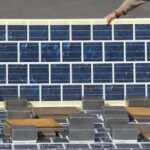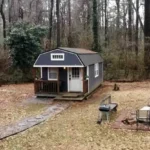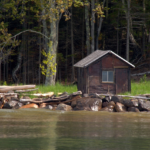Living off the grid is a lifestyle choice that many people are embracing. It involves living without relying on public utilities, such as electricity, water, and gas. Instead, off-grid living relies on alternative sources of energy, water collection and storage solutions, and food preservation techniques. For those who are considering living off the grid, it can be overwhelming to know where to start. In this article, I will discuss the benefits of living off the grid, what a starter kit is, and the essential items needed for a successful off-grid lifestyle.
Introduction to Living off the Grid
Living off the grid means living self-sufficiently without relying on public utilities. This can involve generating your own electricity through solar panels or other alternative energy sources, collecting and storing rainwater, and growing your own food. People choose to live off the grid for many reasons, including a desire for independence, a simpler lifestyle, and a desire to reduce their impact on the environment.
Living off the grid is not for everyone, and it requires a significant investment of time, effort, and money. However, for those who are committed to the lifestyle, it can be a rewarding experience that offers many benefits.
Benefits of Living off the Grid
There are many benefits to living off the grid. One of the most significant benefits is independence. Living off the grid means that you are not relying on public utilities, which can be vulnerable to power outages, water shortages, and other disruptions. By generating your own energy and collecting your own water, you are less vulnerable to these disruptions.
Living off the grid also means that you are reducing your impact on the environment. By generating your own energy through solar panels or wind turbines, you are not contributing to the burning of fossil fuels. Similarly, by collecting and storing rainwater, you are reducing your reliance on municipal water supplies, which can be overburdened and prone to contamination.
Another benefit is a simpler lifestyle. By reducing your reliance on modern conveniences, you can simplify your life and focus on the things that matter most. This can lead to a sense of peace and contentment that is hard to find in our busy, technology-driven world.
Just What is a Living off the Grid Starter Kit?
A living off the grid starter kit is a collection of essential items that are needed to live off the grid. These items can be purchased individually of course, and they are designed to help people get started with off-grid living. A starter kit typically includes items such as solar panels, batteries, water storage containers, and food preservation equipment.
It’s important to note that a living off the grid starter kit is just that: a starter kit. It is not meant to be an all-inclusive package that will provide everything you need for this self sufficient life. Rather, it is designed to help you get started and give you a foundation to build upon.
Essential Items for a Living off Grid.
Solar panels are a key component of off-grid living, as they provide a source of renewable energy. They can be used to power lights, appliances, and other electronic devices. In addition to solar panels, you will also need batteries to store the energy that is generated by the panels.
Water Storage Containers
Collecting and storing rainwater is an important part of off-grid living. You will need water storage containers to store the water that you collect. These containers can be made of plastic, metal, or other materials.
Food Preservation Equipment
Preserving food is essential for off-grid living, as it allows you to store food for long periods of time without the need for refrigeration. Food preservation equipment includes items such as canning jars, a pressure canner, and a dehydrator.
First Aid Kit
Living off the grid can be risky, as there are often no nearby medical facilities. It’s important to have a first aid kit on hand with basic medical supplies.
Solar Power Options for Off-Grid Living
Solar power is a popular option for off-grid living, as it provides a source of renewable energy that is reliable and sustainable. There are several different types of solar panels to choose from, including monocrystalline, polycrystalline, and thin-film. Each type has its own advantages and disadvantages, so it’s important to do your research before making a purchase.
In addition to solar panels, you will also need batteries to store the energy that is generated by the panels. There are several different types of batteries to choose from, including lead-acid, lithium-ion, and nickel-cadmium. Again, each type has its own advantages and disadvantages, so it’s important to do your research before making a purchase.
Water Collection and Storage Solutions
Collecting and storing rainwater is an important part of this lifestyle. There are several different ways to collect rainwater, including using a rain barrel or a cistern. It’s important to ensure that the water you collect is safe to drink, so you will need to filter and purify the water before consuming it.
When it comes to storing water, there are several different types of containers to choose from, including plastic, metal, and concrete. It’s important to choose a container that is durable and can withstand the elements.
Food Preservation and Storage Techniques
Preserving food is essential for off-grid living, as it allows you to store food for long periods of time without the need for refrigeration. There are several different food preservation techniques to choose from, including canning, dehydrating, and fermenting.
When it comes to storing food, it’s important to choose containers that are airtight and can keep out pests. Mason jars are a popular choice for storing canned goods, while mylar bags are a good option for storing dehydrated foods.
Building a Shelter for Off-Grid Living
Building a shelter can be a challenging but rewarding experience. There are several different types of shelters to choose from, including tiny homes, yurts, and of course the log cabin. It’s important to choose a shelter that is durable, energy-efficient, and designed to withstand the elements.
When building a shelter, it’s important to consider insulation, ventilation, and heating. These factors will help ensure that your shelter is comfortable and energy-efficient.
The Self Sufficient Backyard book below tells how a couple created a new lifestyle using simple methods
Regular Maintenance
Regular maintenance is essential for keeping your off-grid equipment in good condition. This includes cleaning, lubricating, and inspecting your equipment on a regular basis.
Monitoring Energy Usage
Monitoring your energy usage is important for ensuring that you don’t deplete your battery storage. Keep track of how much energy you are using and adjust your usage as needed.
Water Testing
Testing your water on a regular basis is most important for ensuring that it is safe to drink. Test your water for contaminants such as bacteria, viruses, and chemicals.
Conclusion
Living off the grid is a lifestyle choice that can offer many benefits, including independence, a simpler lifestyle, and reduced impact on the environment. A living off the grid starter kit can help you get started by providing you with the essential items you need to generate your own energy, collect and store water, preserve food, and build a shelter.
If you are considering living off the grid, I encourage you to do your research and seek advice from others who have successfully made the transition to off-grid living. With the right equipment and a commitment to the lifestyle, living off the grid can be a rewarding and fulfilling experience. Our monthly newsletter is free and full of helpful advice.








